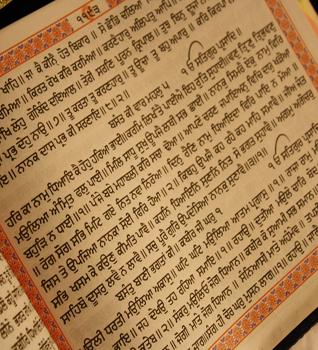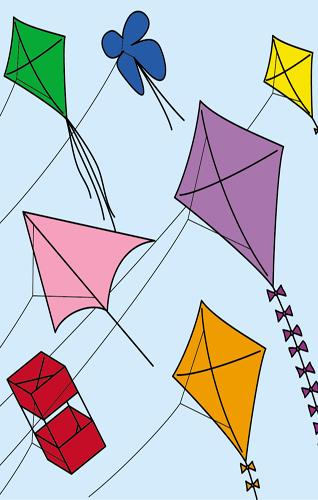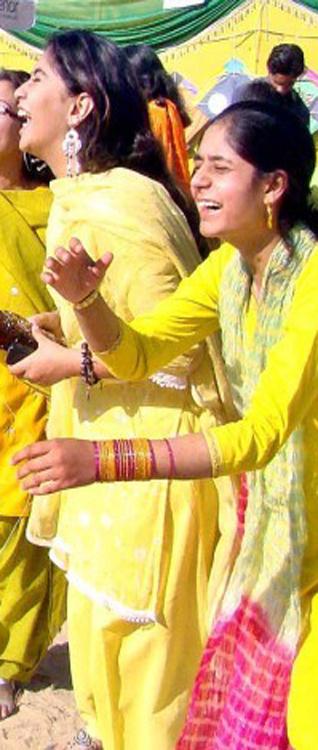Music
Ode to Spring
by DHARAM SINGH & HARNAM SINGH
Basant is a musical measure used in the GurÅ« Granth SÄhib.
It is a rÄga of the season of Basant or spring, and during that season can be sung any time of day or night. Otherwise, it is reserved for the night between 9 p. m. and midnight. It is a very popular and melodious measure tracing its origin to the eighth century. In the RÄgamÄlÄ, as included in the Sikh scripture, it is recorded as a 'son' (puttar) of Hiṇá¸ol which is also a rÄga of spring. The only variant of Basant employed in the GurÅ« Granth SÄhib is Basant Hiṇá¸ol : the latter is not very popular and is used in no other granth. Basant is performed in slow tempo, and this gentle melody depicts quiet joy. The descending scale is usually found at the beginning of a composition with an ascending form.
Ascending : Sa Ga M'a Dha á¹ a
Descending : R'e Ne Dha Pa - M'a Ga M'a Ga Re Sa
VÄdÄ«s : tar saptak á¹ a and madhya saptak Pa
Pakaá¹› :Sa Ma Ga Ma Dha S'a -- R'e Ne
Dha Pa -- M'a Ga M'a Ga Re Sa
If Basant melodies do not begin on upper 'Sa', they will move quickly to it, and then slowly descending on the high VÄdÄ«. Descending vÄdÄ«s are characterized by Ma/tivra - Ga in alternate fast and slow sequence. Sometimes a glide comes between Ne and Dha Komal. In ascending patterns, Re Komal and Pa are avoided.
In the GurÅ« Granth SÄhib, GurÅ« NÄnak, GurÅ« Amar DÄs, GurÅ« RÄm DÄs, GurÅ« Arjan and GurÅ« Tegh BahÄdar, besides KabÄ«r, RÄmÄnand, NÄmdev and RavidÄs, have composed hymns in the Basant measure.
GURU ARJAN'S 'ODE TO SPRING' - BASANT KI VAR
Basant ki Var, by GurÅ« Arjan, is the shortest of the twenty-two vÄrs, i. e., spiritual poems composed in the style or tone of odes (vÄrs, in Punjabi) or heroic ballads included in the GurÅ« Granth SÄhib.
Basant, Punjabi for spring, from which the musical measure, VÄr, derives its title is, like MalhÄr (the rÄga of the rainy season), an ancient seasonal rÄga - the rÄga of springtime.
Basant kÄ« VÄr comprises three pauṛīs or stanzas only, each pauṛī consisting of five lines. Like the VÄr of BalvaṇḠand SattÄ and unlike any other vÄr in the GurÅ« Granth SÄhib, this vÄr does not have any Å›lokas added to the pauṛīs.
The vÄr addresses itself to the theme of the GurÅ«'s grace which alone will enable man to overcome his ego or selfhood and, thus, attain, communion with the Creator. Springtime is the period of newness when vegetation stirs to life and nature comes to bloom in all its beauty and splendour. As the GurÅ«'s grace occurs, man sheds the winter-born leaves of ego, lust, greed, attachment and anger and blossoms into nÄm, joy in the constant remembrance of God.
If Basant, i.e., spring, is the season of union, this VÄr impresses upon Man to submit himself to the true GurÅ« to achieve union with the Divine. Those who meditate on the Name and surrender themselves to the Will of the Lord are gurmukhs. They are holy, turned towards the GurÅ« (gur=gurÅ«, mukh=face, i.e. face turned towards the GurÅ«). They alone overcome the five vices, companions of manmukhs, the self-willed. Such men and women succumb not to grief, nor are they beguiled by pleasures. They are freed from the cycle of birth and death. Transmigration thus annulled, the self merges in the Creator.
THE ODE
Meditate on the Lord's Name, and blossom forth in green abundance.By your high destiny, you have been blessed with this wondrous spring of the soul.
See all the three worlds in bloom, and obtain the Fruit of Ambrosial Nectar.
Meeting with the Holy Saints, peace wells up, and all sins are erased.
O Nanak, remember in meditation the One Name, and you shall never again be consigned to the womb of reincarnation.. ||1||
The five powerful desires are bound down, when you lean on the True Lord.
The Lord Himself leads us to dwell at His Feet. He stands right in our midst.
All sorrows and sicknesses are eradicated, and you become ever-fresh and rejuvenated.
Night and day, meditate on the Naam, the Name of the Lord. You shall never again die.
And the One, from whom we came, O Nanak, into Him we merge once again. ||2||
Where do we come from? Where do we live? Where do we go in the end?
All creatures belong to God, our Lord and Master. Who can place a value on Him?
Those who meditate, listen and chant, those devotees are blessed and beautified.
The Lord God is Inaccessible and Unfathomable; there is no other equal to Him.
The Perfect Guru has taught this Truth. Nanak proclaims it to the world. ||3||1||
[Article, courtesy: 'The Encyclopaedia of Sikhism'. Translation of the verses are by Dr. Sant Singh Khalsa.]
February 13, 2010






